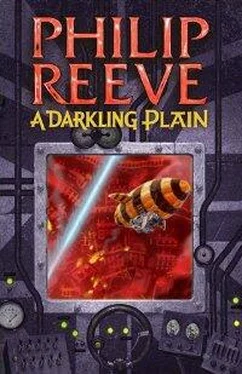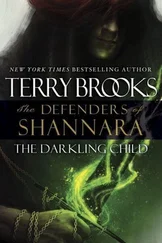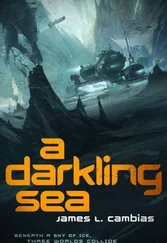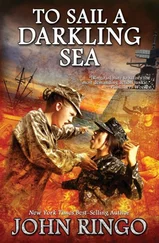At the top of a low rise he stopped and shouted, “Hello!”
“Ssshh!” hissed Wolf, whirling around.
“Yes, Dad!” said Wren. “Someone will hear you!”
“That’s what we want, isn’t it?” asked Tom. “Didn’t we come here to find people, if there are people here at all? And Wolf, you said yourself that they weren’t hostile…” He cupped his hands to his mouth and shouted again, “Hello!” Echoes ran off and hid themselves among the wreckage. As they faded, there was a shrill, trilling whistle, but it was only another bird.
The path led through a shadowy canyon between the rust crags and then out into sunlight again. Tier-support pillars, broken gantries, and shards of deck plate lay jumbled together, blackened and fused by unimaginable heat. The travelers scrambled over a tangle of rusting six-inch hawser, like gnats creeping through a bowl of congealed spaghetti. Beyond it a wrenched rind of deck plate arched over the pathway. As they passed beneath it Wren sensed movement above her and looked up, but it was only a bird—a nice, ordinary, non-Stalkerized bird—gliding higher and higher on the thermals that were rising from the sun-warmed wreck. They moved on, passing through the cool shade of the arch and out into sunlight again.
And behind them a sudden babble of shouts and howls broke out, spinning them around, making Wolf curse and Wren grab for her father’s hand.
The steep screes of rust flakes beside the path had come alive with raggedy, careering figures, and more were letting themselves down on ropes from hiding places in that twisted arch. Wolf aimed his gun at one of them, but Tom shouted, “No, don’t!” and snatched at his arm so that the shot went wide. Before Wolf could fire again, he was surrounded by grimy young people with homemade weapons, all shouting, “Hands up!” and “Don’t move!” and “Throw down your guns!” Some of them had feathers in their hair, and had drawn stripes of rusty mud across their faces like war paint. One, a girl in a grubby white rubber coat, jumped down close to Wren and pointed a crude crossbow at her.
Wren had had all sorts of things pointed at her since leaving Anchorage—everything from clunky old Lost Boy gas pistols to shiny new machine guns. It never got boring. She knew of nothing quite so uncomfortable as finding that your life was suddenly in the hands of someone you had never met, who did not seem to like you very much, and who could snuff you out in an instant by simply squeezing a trigger. She raised her hands and smiled weakly at the crossbow girl, hoping she wasn’t prone to twitchy fingers.
Tom was trying to explain to his captors that he was a Londoner and a Third Class Apprentice in the Guild of Historians, but they didn’t seem interested. Someone had snatched Wolf’s pistol and was pointing it at him. Wolf looked so angry and ashamed at being captured that Wren felt sorry for him, and wished she could think of something she could say to comfort him. It had not been his fault, and she was glad that her father had stopped him from shooting anybody.
The man who seemed to be the leader of the ambush came stumping over to peer suspiciously at Wren. He was older than the others, short and squarish, with cropped gray hair and a tattoo just above the bridge of his nose in the shape of a little green compass. Wren sensed that he was afraid of her, which was a bit rich when you considered that he had a dozen heavily armed juvenile delinquents on his side. He was clutching a gun of his own; a strange thing, covered in wires and tubes, with a flat zinc disk where the muzzle ought to be.
“Well, young woman?” he demanded tetchily. “What is your game? What are you doing in London?”
Wren tilted her chin at him and tried to look haughty. “We’ve come to see Clytie Potts,” she said.
“What?” The man looked surprised. “You know Clytie?”
“This one keeps saying he’s a Londoner, Mr. Garamond,” shouted one of the boys who had captured Tom.
“Rubbish!” The man looked at Wren again, chewing his lower lip as he considered what to do.
“Very well, everyone,” he said at last. “Bind the prisoners’ hands. We shall take them to the lord mayor.”
Chapter 19
The Holloway Road
With their hands tied in front of them, surrounded by the fierce-looking young Londoners, the travelers resumed their journey. Their captors did not lead them east, into the heart of the debris field, as they had expected, but turned north instead. The girl guarding Wren pointed with her crossbow toward the central heights and said, “Lots of ’ot zones in there. Round ’ere, too, only not so bad. If you’d kept going, you’d have ended up slap bang in Electric Lane. Nasty.”
Wren had no idea what she was talking about, and before she could ask, Mr. Garamond shouted angrily, “Be quiet, Angie Peabody! Stop fraternizing with the scavengers!”
“I ain’t fraternizing with nobody!” cried the girl indignantly.
“We aren’t scavengers,” said Tom politely. “We are simply—”
“Be quiet!” insisted Garamond, like a teacher struggling to keep an unruly class in order. He held up his hand for silence. Around his neck on a length of cord hung a curious little machine with many aerials, and he was frowning at a gauge on its top. “Sprite!” he shouted suddenly. “Everybody down!”
His young followers obeyed him instantly, flinging themselves down in the mud and pulling Tom, Wren, and Wolf down with them. There was a faint buzzing sound that grew quickly louder and higher pitched until it passed beyond the reach of human hearing; then a gigantic arc of lightning crackled across a gap between two spires of melted deck plate.
“What was that?” gasped Wren, trying to rub the afterimage off her eyes as crossbow girl helped her to her feet.
“Lingering energy from MEDUSA,” said Tom’s guard cheerfully. “We call ’em ‘sprites.’ That one was pretty pathetic compared with the monsters we used to get. In the old days the whole of London was hot.”
“Please be quiet, Will Hallsworth,” shouted Mr. Garamond, waving the party onward. Hallsworth glanced at Wren and grimaced like a cheeky schoolboy, making her smile. She decided that she had been captured by far worse people than these young Londoners in her time.
The path they were following veered away from the deeper ruins, and they passed through no more hot zones. Twice they crossed places that were almost free of wreckage, stretches of open ground where crops were ripening. Among the rubble heaps scrap-metal windmills rose like rusty sunflowers.
They descended into a broad, V-shaped valley, whose walls were dead buildings and whose muddy floor lay deep in shadow. Looking up, Wren saw that the sky was hidden by the branches of overhanging trees and by a complicated mesh of knotted ropes and hawsers, through which dead branches and scraps of fabric had been threaded, forming a sort of roof. A few shafts of sunlight shone in, falling like spotlights on the airship that lay tethered on the valley floor.
“The Archaeopteryx!” cried Tom, recognizing the handsome little ship he had last seen pulling away from Airhaven.
“So this is where they hide her…” Wolf sounded grudgingly impressed. He was starting to forget the indignity of his capture, and was looking about with as much interest and curiosity as the others.
They passed the silent airship, then a line of battered tanks labeled fuel and lifting gas, and finally a small guard post with tattered deck chairs, and views of old London tacked to the tin walls. The valley ended at a sheer cliff of metal, and Garamond ordered his party into a tunnel that seemed to lead under it.
The roundness of the tunnel, and its ribbed walls and roof, puzzled Tom, until the Londoners lit lanterns and he realized that it was one of the old air ducts that lay looped like lifeless snakes throughout the wreck. Rails had been laid along the bottom of the duct, and a couple of wooden carts stood ready at the buffers. Above them, on the curving wall, an old enamel sign gleamed in the lantern light. It was the name plate from a London elevator station; a broad red ring in the middle of a white square, crossed by a vertical blue bar. In white letters on the blue were the words holloway road.
Читать дальше












